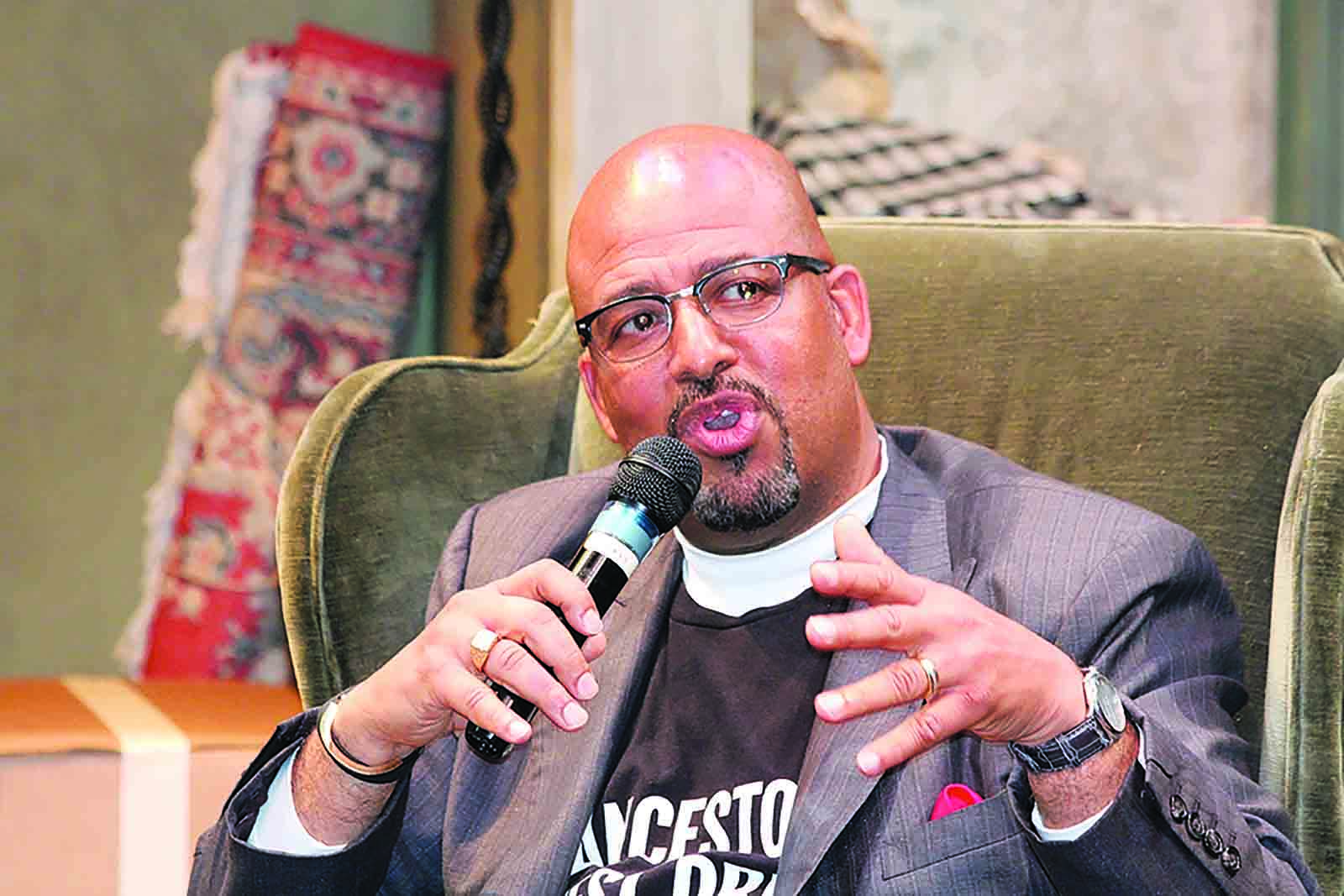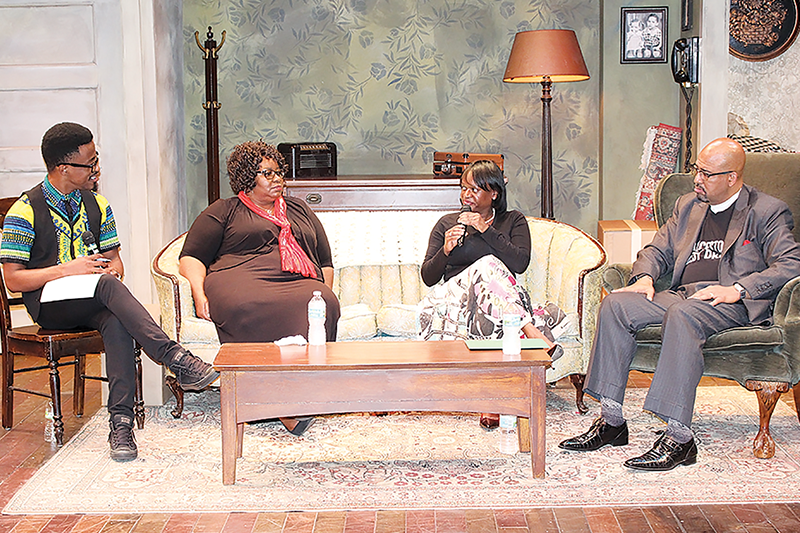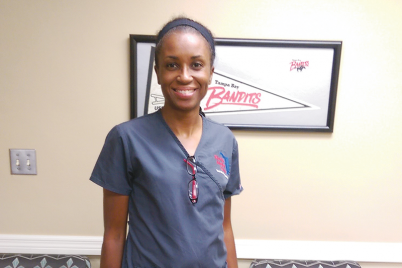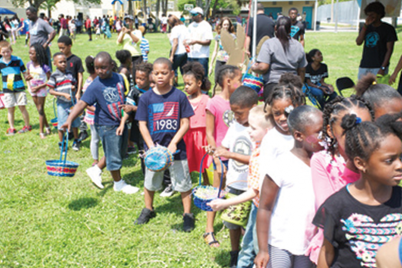L-R, Patrick A. Jackson, Ronnell Montgomery, Dr. Kanika Tomalin and Kenny Irby
BY FRANK DROUZAS, Staff Writer
ST. PETERSBURG – After watching a showing of “A Raisin in the Sun,” the American Stage Theater treated theatergoers to a community conversation that tied the themes of the play in with current issues plaguing the city—integration and assimilation.
Moderating the discussion was Patrick A. Jackson, education associate at American Stage. A resident of St. Pete since last July, Jackson also plays the role of Joseph Asagai in the current production of “A Raisin in the Sun.”
The panel included Kenny Irby, Community Intervention Director at the St. Pete Police Department and pastor at Bethel AME Church; Deputy Mayor and City Administrator Dr. Kanika Tomalin and Ronnell Montgomery, vice chair, diversity and Inclusion, St. Pete Chamber of Commerce and community outreach specialist at the James B. Sanderlin Neighborhood Family Center.

Kenny Irby, Community Intervention Director at the St. Pete Police Department and pastor at Bethel AME Church
Tomalin, a fifth-generation city resident, noted that she has personally witnessed great change in the city in the past couple of decades, and “monumental” change for her family, as her great-great-grandmother lived in St. Pete.
“I can guarantee you that she would never have conceived of a time where one of her descendants would be the second authority in the city where she was making her life and making her living,” Tomalin said.
The deputy mayor stated that opportunity has changed significantly over the decades, adding that the best opportunity her grandmother could find was work as a domestic servant–all while raising 15 children.
“Because she set other people’s tables, I feel like I’m now able to sit around our city’s most powerful tables and make a difference for future generations,” said Tomalin, adding that her grandmother has had two grandchildren hold the second highest office in the city.
Montgomery, who was born and raised in Los Angeles, has lived in St. Pete for about 25 years. She witnessed the city’s growth and saw great opportunities to make an impact in many ways.
“There’s so many opportunities to volunteer, get involved, to have your voice heard, and I guess that’s what attracts me,” she said.
Irby, who is also president of Men and Women in the Making, a community and intervention outreach program for at-risk youths, has lived in the city for nearly a quarter century himself and noted that he has seen “tremendous change” in the St. Pete. Coming here initially as a faculty member at the Poynter Institute and only expecting to stay for about five years, he wound up becoming a full-fledged resident of a city where he wanted to raise a family.
Jackson pointed out that there was something that drew him to St. Pete while he was living in Sarasota, and decided to move here permanently. As a cast member in the American Stage production of “A Raisin in the Sun,” Jackson said that integration is one of the many themes of Lorraine Hansberry’s groundbreaking family drama.
Concerning integration in St. Pete specifically, Irby said he and his family went through a period in the mid-1990s where they were given varied advice as to where exactly in the city it would be best for them to settle. Irby and his family ultimately found a home in Stephenson Manor.
“That was one of the last communities to integrate and allow black people to own homes in that area on the south side,” Irby said, adding that while he was looking for a home, he was reminded of “what St. Pete used to be,” only to see it “transform in tremendous ways.”
Tomalin explained that segregation clearly can be enforced but integration has to be inspired.
“I think that as a community,” she went on, “our collective conscious is still working to get to that place. I think that we have ‘9 to 5’ integration. We are very much a progressive community that understands and values diversity, but that falls short of the level of integration that I think will take our city to the next level.”
The deputy mayor underscored that integration must be inspired and it’s about “those social circles where we create our selected family,” noting how the world is getting smaller through the internet and social media.
Jackson said that as a millennial, there’s a “consciousness” that his generation inherited since he remembers what the world was like before the internet. During pre-show workshops for students, Jackson and the cast members asked the students what would they do if their own dreams were deferred, referencing the Langston Hughes line from which “A Raisin in the Sun” gets its title.
“And they were like, ‘That’s not an option!’,” he said.
Tomalin said that children these days can become teachers of the adults and we must honor what they offer.
“Their experience is so different from our own,” she said.
Validation is so important for young people, Irby pointed out.
“The idea of validating their diverse thoughts, and that their world is a different world that they’ve inherited–we do have to be a foundation and guidepost for them–but allowing them to zig in places where we zag, and to be creative and innovative in new ways as they pursue these challenges that we’re still struggling with as a society.”
Montgomery stressed the importance of having open discussions with the younger generations.
“Let them fly, but let them understand this is not always as it has been, so they’ve got to take the opportunities as they arise,” she said.
Directly quoting a line from “A Raisin in the Sun,” Jackson said, “‘People can get awful worked up when they feel that their whole way of life and everything that they have ever worked for is threatened.'” As to how a sentiment like that relates to our local community today, Montgomery said “equitable inclusion” is important.
“It’s making sure that people are brought up from where they are,” she said, “and it doesn’t take anything from anybody else.”
We’re on one continuum, Tomalin said, with fear on one end and love on the other. When we hear that type of fear, she explained, enter a conversation or dynamic, “expressly or implicitly, understanding that in this human condition and experience there is ability at all times to move on that continuum, toward that end of love.”
Pastor Irby maintained that he believes the opposite end of fear on this continuum is faith.
“I wouldn’t have made the commitment to this city that the city offered to me,” he said, “if I really didn’t think that there was genuine intentionality around creating opportunities for all the citizens in this city, in its diverse manifestations.”
What we have to do, Irby pointed out, is to “be in dialogue and not diatribe” about all the possibilities and benefits for citizens in the south side and the north side of St. Pete.
As for concrete things that have happened in the city to move us toward a more inclusive community, Montgomery said there are programs in place to assist minority-owned businesses and not making it so cost-prohibitive for some to join the Chamber of Commerce.
Tomalin said when she and the rest of the Mayor Kriseman administration took office in 2014, it focused on approach. For a long time, she explained, the city government as it related to the transformation of disenfranchised areas was focused on “place-making.” The Kriseman administration decided to focus on people as much as places.
“As a result, we have wraparound services that are lifting people out of poverty every day in great numbers,” she said. “The poverty rate is being eradicated in St. Petersburg at a rate faster than the state and the nation in all the peer cities we compare ourselves to. And the African-American poverty rate is moving even faster than that.”
This is happening in sustainable ways, Tomalin added, that will allow people to self-perpetuate their new lifestyles, so the tangible shift will come with what they are able to do for themselves.
Since he works with the area’s youth, Irby noted that St. Pete was the only city in America to adopt President Obama’s My Brother’s Keeper initiative and to expand it to My Brother and Sister’s Keeper initiative.
“We do care about all the children across the city and recognize that access to success is different across the city,” he said.
“A Raisin in the Sun” is on stage until Feb. 25.
To reach Frank Drouzas, email fdrouzas@theweeklychallenger.com
Post Views:
6,056









